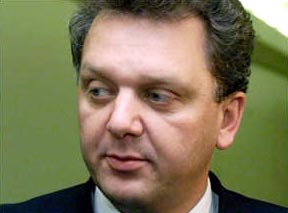
RUSSIA-TURKEY RELATIONS: COOPERATION AND COMPETITION IN ENERGY SPHERE
Publication: Eurasia Daily Monitor Volume: 3 Issue: 107
By:

Both Moscow and Ankara appear intent on further developing their lucrative energy ties. At the same time, Russia and Turkey are destined to continue vying for the role of major fuel supplier to the countries of Southern Europe.
The recent visits to Turkey by two top Russian officials highlighted the complexities of the Russian-Turkish relationship in the energy sphere. On May 31, Russian Foreign Minister Sergei Lavrov came to Ankara for two-day talks with the Turkish leadership. A day earlier, a Russian delegation headed by the Minister of Industry and Energy Viktor Khristenko took part in the work of the Russian-Turkish Intergovernmental Commission on Trade and Economic Cooperation in Istanbul.
Most Russian commentators point out the important place Turkey occupies among Moscow’s foreign policy priorities. The joint Political Declaration signed by the presidents of the two neighboring countries in December 2004 established the goal of bringing the bilateral relations to the level of a mature, multifaceted partnership. Remarkably, over the last year and half, there were six meetings between Russian President Vladimir Putin and Turkish leaders. According to Turkish press reports, Turkey’s President Ahmet Necdet Sezer and Parliament Speaker Bulent Arinc are to visit Russia soon.
Russian-Turkish strategic rapprochement rests on the solid foundation of growing economic ties. Russia is Turkey’s second-largest trading partner. The trade volume stands at $15 billion and the two countries aim to further boost it to $25 billion. Turkish investments in Russia have almost reached $3 billion. Last year, the two countries inaugurated the landmark Blue Stream undersea pipeline, which carries 5 billion cubic meters of Russian natural gas (slightly less than one-third of all Russian gas supplies to Turkey) to the Turkish Black Sea port of Samsun. According to Russian officials, there is considerable potential for further cooperation in nuclear energy as well as in the military-technical and aerospace spheres. In an interview published in the Turkish newspaper Milliyet on May 31, Lavrov said Russian companies were “greatly” interested in Turkey’s plan to build its first nuclear power plant and were making preparations to bid for the construction of the facility.
After talks with his Russian counterpart, Turkish Foreign Minister Abdullah Gül called the energy cooperation between the two countries “extraordinary,” adding that energy cooperation with Russia would continue. He also reiterated Turkey’s desire to transport energy to third countries as well. For his part, Lavrov noted that Russian-Turkish energy cooperation served the national interests of both countries and specifically praised the Turkish stance, saying Ankara has avoided introducing political concerns into the energy cooperation process — an apparent swipe at Western policymakers who accuse the Kremlin of using energy as a political lever.
U.S. Secretary of State Condoleezza Rice, when she visited Ankara last month, warned Turkey against allowing Russia to gain a monopoly over Europe’s supply of natural gas, a statement that likely rattled the Kremlin leadership. A commentary published in the Turkish daily Sabah on May 30 argues that, unlike Washington, Ankara is not very concerned about Moscow establishing a monopoly over the region’s energy supplies. The commentary further suggests, “It is inevitable” that the partnership between Russia and Turkey — “the leading countries in the region” — will continue to develop.
At the same time, Turkish analysts contend, Ankara will simply not allow Russia to become an energy monopolist, as Turkey is intent to turn itself into a major energy hub supplying fuel to the European countries.
As worries over Russian energy policies are on the rise in Europe, Turkey will likely seek to take advantage of its strategic position as a key energy transit country. Turkey receives the bulk of its gas supplies from Russia and Iran. Now BP is close to completing a second Caspian energy link after the Baku-Tbilisi-Ceyhan oil pipeline — the South Caucasus Pipeline, to take gas from the Azeri offshore field of Shah Deniz via Georgia to the Turkish city of Erzurum, where it connects to Turkish pipelines. With Turkey receiving more gas than it can possibly consume, Ankara’s main task is to arrange for deliveries of the surplus fuel to European markets. Thus, Turkish officials have started billing their country as a principal “energy gateway” to Southern Europe: Turkey and Greece are currently building a 300-kilometer connector with a capacity of 3.5 billion cubic meters a year, which is due for completion this year and could be expanded to 11.5 billion to deliver gas to Italy. Besides, talks have resumed about the ambitious 3,300-kilometer onshore Nabucco project, linking northern Iran and Europe via the Caspian and Turkey.
With the obvious purpose of playing various energy suppliers against one another, Ankara is pressing the Russian side to grant it the right to re-export the certain amounts of imported gas — a concession Gazprom, Russia’s energy monopoly, is reluctant to make. But now, with alternative sources of energy at its disposal, Ankara appears to have strong leverage over Moscow. Furthermore, since Turkey is seeking full membership in the European Union and Brussels is increasingly preoccupied with the diversification of Europe’s sources of energy supplies, Ankara may want to please its European partners and opt for Azeri gas instead of Russian fuel to realize its ambitious role as an emerging supplier of hydrocarbons to the European markets.
The possibility of such a development clearly bothers Russian strategists. If this scenario comes to pass, Russian energy expansion into the Mediterranean market — in particular, the construction of the second phase of the Blue Stream pipeline pushed both by the Gazprom management and the Kremlin leadership — will be thrown into doubt.
(Nezavisimaya gazeta, Turkish Daily News, June 1; Milliyet, May 31; Vremya novostei, Sabah, May 30)




